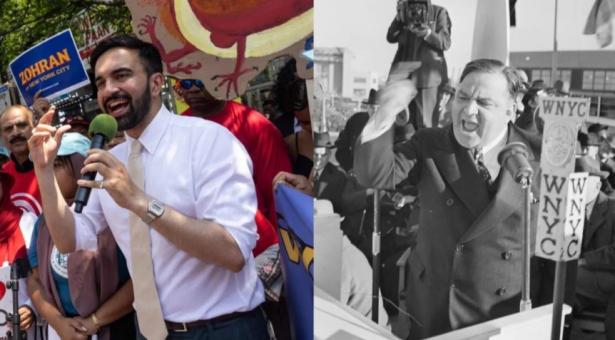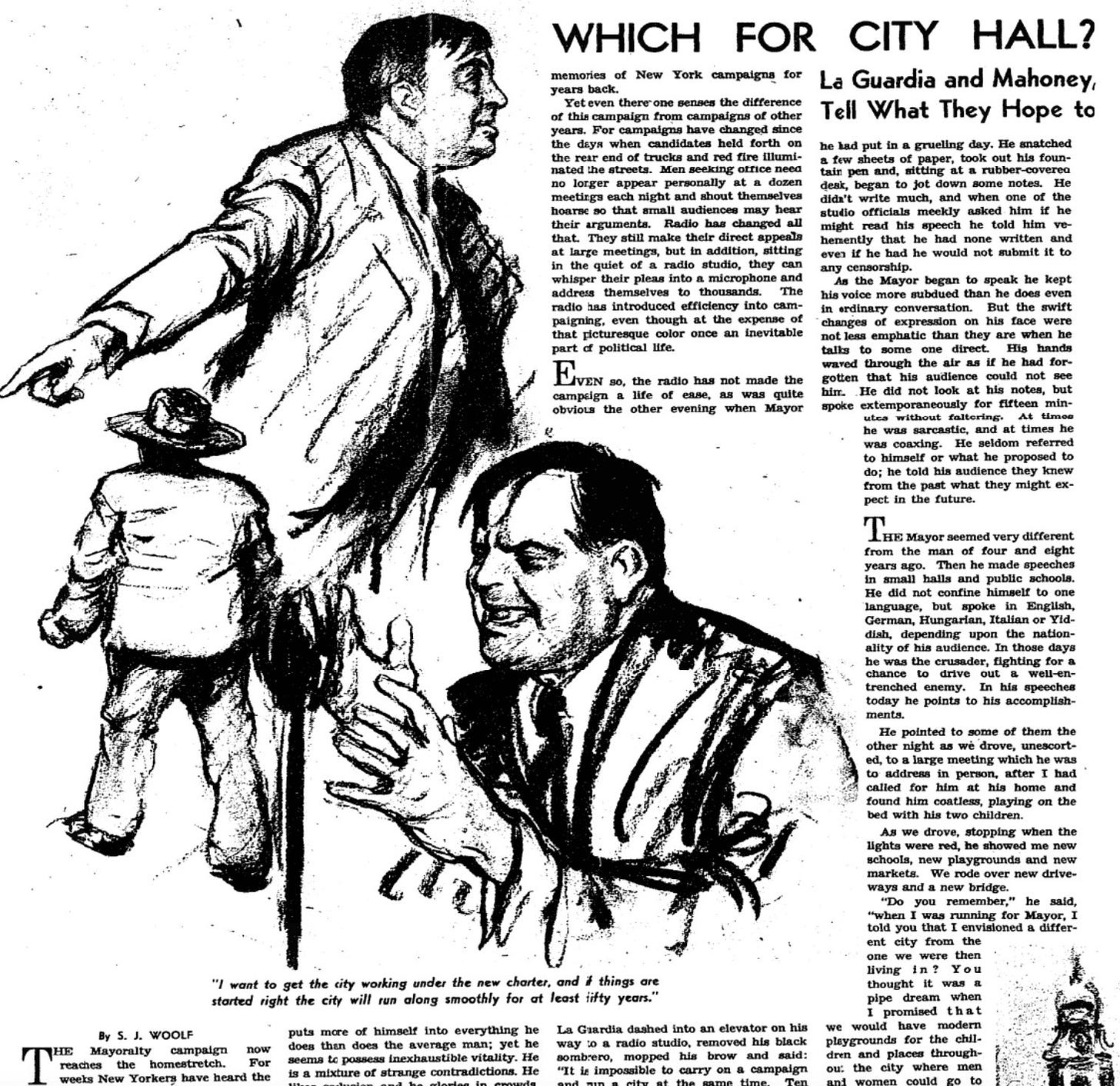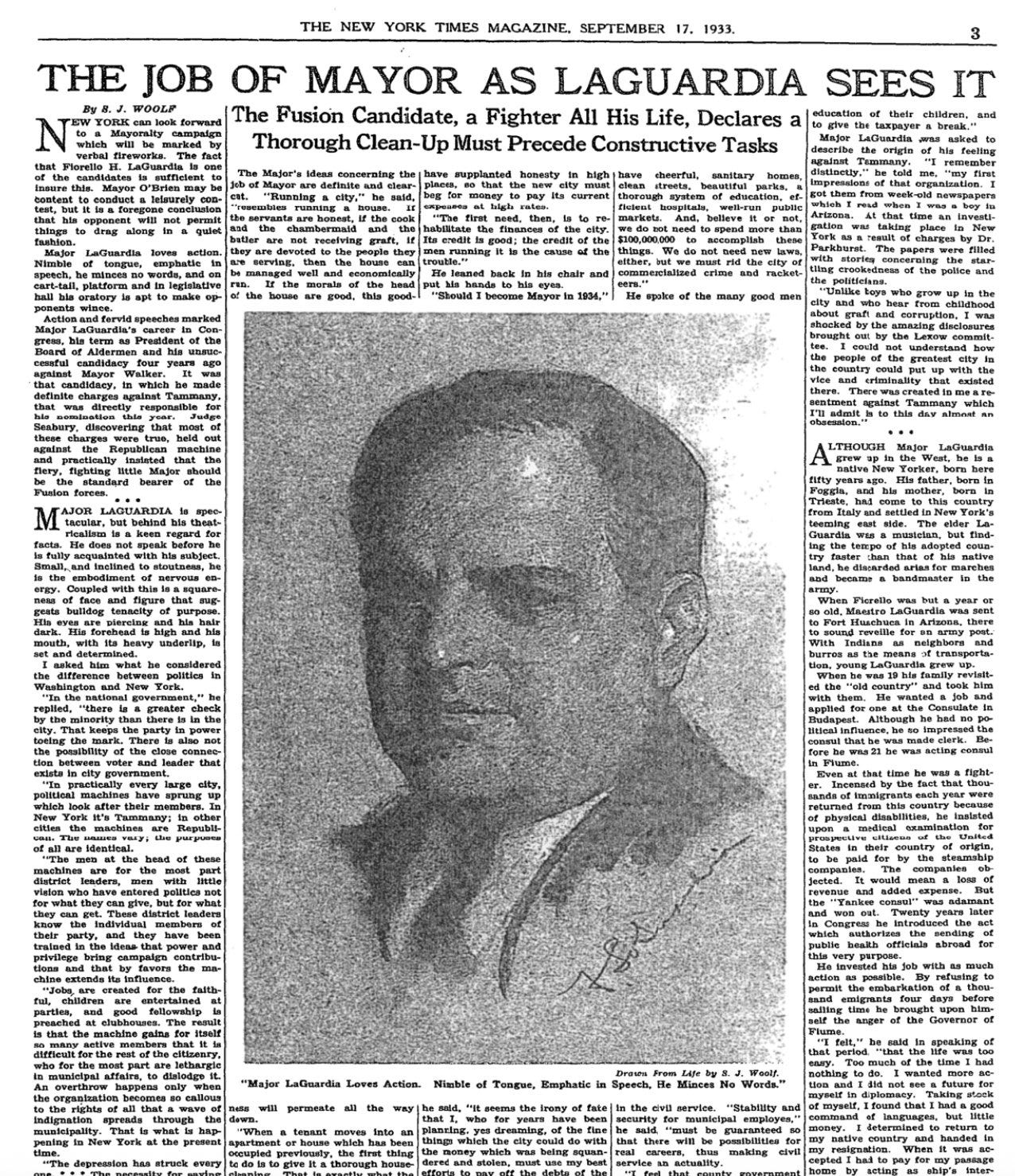In 1935, at the end of NYC Mayor Fiorello La Guardia's first year in office, The New York Times editorial board assessed him bluntly:
“[He is] fond of toying with haphazard proposals that may be benevolent in intention but are dangerous or impossible in practice. He seems always to want to have in hand some socialistic plaything or other. Just now it is a municipal power plant.”
Today, of course, La Guardia is remembered not as a dangerous radical but as perhaps the greatest mayor in American history, the archetype of bold and effective urban leadership. What was once derided as a "socialistic plaything"—a publicly-owned municipal power plant—has returned in new form as a central plank of contemporary policy. New York’s recent Build Public Renewables Act, championed by Zohran Mamdani, the city's chapter of the Democratic Socialists of America, a broad coalition of labor unions, and even Governor Kathy Hochul herself, embraces the very model that once drew scorn. Yesterday’s radicalism, as it turns out, often becomes today's mainstream consensus.
The treatment Mamdani now faces—accusations of radicalism, communism, terrorist-sympathies, naiveté—is strikingly similar to the language once aimed at La Guardia. In the fierce mayoral campaign of 1933, La Guardia's opponent Joseph McKee mocked him as "Comrade La Guardia," calling him "a menace…to the cardinal principles of American life."
As historian Joshua Freeman writes:
Ironically, the mayor who governed like a socialist of sorts — Fiorello La Guardia, who served 1934 to 1946 — was a lifelong Republican. Throughout his career, first in Congress and then as mayor, La Guardia had strong ties with those to his left. In 1924, he even successfully ran for reelection to the House of Representatives on the Socialist Party line, after his own party denied him the nomination because of his support for Progressive Party presidential candidate Robert M. La Follette.
(Though LaGuardia asked to be listed in the House as a Progressive, the clerk put him down as a Socialist, leading the only actual Socialist in Congress, Milwaukee’s Victor L. Berger, to drolly declare the New Yorker “my whip.”)
La Guardia himself understood exactly how this rhetorical game worked. In a reflective moment in 1933, he lamented to the Times, "The worst part of the entire matter is that when anyone raises a question about the existing order, he is called either a reformer or a radical. It has been my lot to be called the latter. Why? Only because I have consistently objected to things which I believe unjust and dangerous." Such candor is rare among politicians, but La Guardia leaned into it. He owned the label of radicalism, famously declaring, "If fighting against existing evils is radical, I am content with the name."
But these rhetorical attacks didn’t stop at domestic policy. When La Guardia spoke forcefully against fascism abroad in 1938, conservative ethnic groups, including the German-American Citizens League, dismissed him as "un-American, socialistic, and communistic." One Brooklyn Republican accused him of making "unwarranted and unnecessary utterances," effectively casting La Guardia’s anti-fascist statements as irresponsible provocations on the global stage. To La Guardia’s critics, his radicalism was always two-fold: a threat both domestically and internationally.
His opponent in the 1937 mayoral race, Joseph Mahoney, explicitly linked radicalism with disorder and chaos:
"The radicals are those who are opposed to law and order and who endeavor by force to impose their will upon us. I am as liberal as any man, but I refuse to permit my city to be made unsafe for the law-abiding citizen by men who have no respect for authority."
La Guardia responded defiantly, embracing the label thrust upon him:
"I was pronounced dangerous. Was I half as dangerous as the men who were carrying on these manipulations? I have been called a radical. If fighting against existing evils is radical, I am content with the name."
When La Guardia, then president of the Board of Aldermen, proposed funding snow-removal equipment ahead of winter storms, Comptroller Charles Craig reacted furiously, labeling the idea "the wildest kind of radical, socialistic, BlackGuardia statement." The accusation crystallized a widespread fear among La Guardia's contemporaries: that expansive government initiatives were inherently reckless, costly, and ideologically suspect. Yet those very initiatives, dismissed as ideological whims at the time, built much of the essential infrastructure upon which modern New York still relies.
La Guardia consistently responded to these charges with moral conviction. Speaking at a police breakfast in 1938, he drew a striking parallel: "I believe was sincere in His denunciation of the powerful few who exploited the masses. What some of us who are called radical are trying to do is to answer that call in His name."
Today, Zohran Mamdani’s platform—universal childcare, expanded transit, a rent freeze—is met with the usual cries of radicalism. Opponents cast him as naïve, extreme, out of step, a risk to the city’s stability. But this is a familiar story in American politics. What gets dismissed as reckless idealism in one era often becomes the infrastructure of civic life in the next.
La Guardia wasn’t just aligned with Franklin Roosevelt’s New Deal; he anticipated it, shaped it, even inspired it. As biographer Jay Franklin observed, La Guardia was a “New Dealer before there was a New Deal,” pioneering progressive policies at the municipal level that Roosevelt later scaled into a national blueprint.
At a time when America’s political landscape seemed poised for transformation, La Guardia understood the potential of fusing labor and progressive politics into practical, pragmatic governance. Roosevelt didn’t simply find an ally in La Guardia; he found a forerunner and collaborator: a mayor whose bold experiments became foundational to FDR’s sweeping national agenda. Their partnership, warm enough for Roosevelt to affectionately call him “Fiorello,” symbolized how local innovations in governance could ripple upward, reshaping an entire country. As historian Joshua Freeman writes:
Buildings, infrastructure, and social services were important, but La Guardia believed ordinary people deserved more. Running for mayor, he declared, “I want justice on the broadest scale. . . . justice that gives to everyone some chance for the beauty and the better things of life.”
La Guardia’s ideas aged well; his critics did not. La Guardia’s lasting achievements—from creating a unified, publicly owned transit system to establishing the boldest housing and health programs in the country—illustrate precisely what a socialist-inflected mayoralty can accomplish, even under constraints, making him a compelling model for contemporary progressive and socialist politicians today.
That’s the political history Mamdani is stepping into. The resistance to his campaign isn’t about the specifics of his policies; it’s about the threat they pose to a political class that long ago stopped thinking in terms of possibility. What we’re watching isn’t a clash between pragmatism and idealism, but between stagnation and the kind of reform that, given time, tends to look like common sense.
The pattern is consistent: when traditional coalitions grow complacent or compromised, new actors emerge to articulate the unmet needs of the moment. Mamdani’s campaign reflects precisely this kind of historical rupture: an effort to realign political priorities around affordability, public goods, and working-class power. The opposition he faces says less about the viability of his ideas and more about a status quo incapable of renewing itself.
Waleed’s Substack is a reader-supported publication. To receive new posts and support my work, consider becoming a free or paid subscriber.
Waleed Shaheed: Progressive and Democratic strategist. Director of The Bloc. Former Justice Democrats spokesperson. Worked with Bernie, AOC, Jamaal Bowman, and Summer Lee. YNWA. Follow Waleed: Substack the-block Instagram Bluesky X







Spread the word